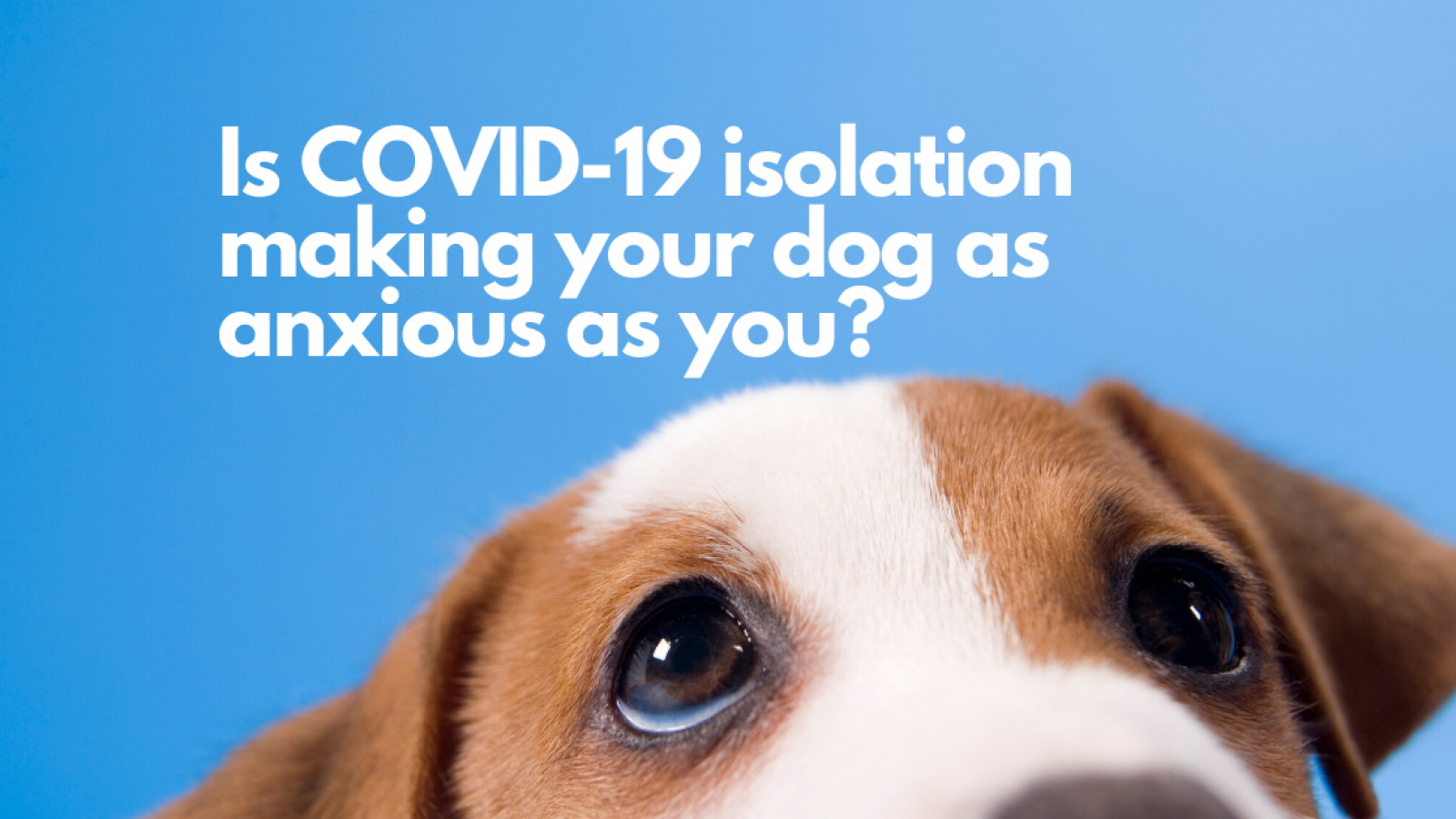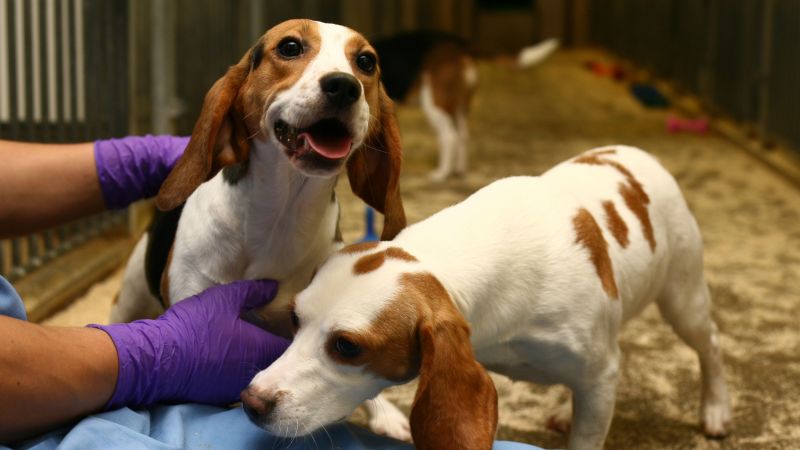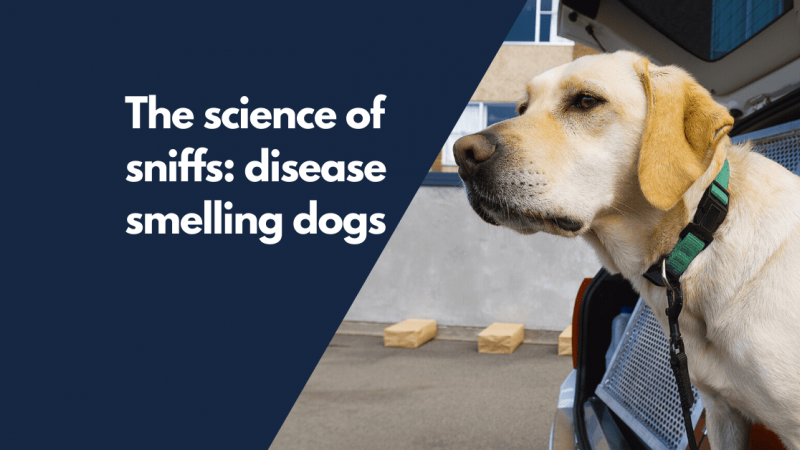Dog are more anxious than you would expect. Very receptive to humans, they can mirror their emotions. Is the context of the COVID-19 mass confinement going to cause the animals more stress? According to vets, coming out of isolation might be more of a problem. But understanding the roots of separation anxiety might alleviate the strain.
Best known for their cheery welcomes, goofy smiles and happy play time, dogs are actually quite anxious creatures. A recent study on 14,000 dogs from 264 breeds suggests that anxious behaviours may be more than widespread. The largest ever study on canine temperaments showed evidence that nearly three quarter of the pets (72.5%) displayed at least one anxiety related behaviour – and the relevant behavioural issues linked to those, such as barking or aggressiveness - with some variation across breeds.
Understanding dog anxiety
Before you start rushing (post-confinement) to dog behaviourists, it is important to understand what stress means for a dog. For example, the most common issue reported was noise sensitivity, especially to things like fireworks and thunder, affecting nearly a third of the dogs in the study. Some behaviours also tended to cluster with others. Dogs with separation anxiety, for instance, also tended to be compulsive and hyperactive.
Breed clustering of some behaviours seem to suggest genetic characteristics, and thus an inherited component to anxiety, as it is the case in humans. That said, a dog’s experiences will certainly affect its behaviours as well. Breeds shouldn’t be unilaterally stereotyped. A better understanding of these differences could help pet owners and vets better care for their pups, and perhaps even reduce the number of animals that end up in shelters.
Ultimately, the study underscores the complex inner lives of dogs—paralleling, perhaps, the people that helped shape them in the first place. And, unfortunately, the loving pet owners might actually be playing unconsciously a role in the day to day stress of their beloved animals. Dogs are very receptive animals, and can harness and mirror very easily the stress of their human families, which has probably increased quite a bit in these uneasy conditions.
Dogs mirror human stress
Just like stress is contagious among humans, it can be transferred to dogs. A 2019 study revealed for the first time this interspecific synchronisation in long and short term stress levels. Scientists found higher cortisol levels in owners matched raised levels in canine companions.
This confirms what many owners will have already worked out for themselves. Household pets are not oblivious to their owners’ anxieties, but mirror the amount of stress they feel, probably due to the close bonds they have formed.
As anxiety can impair welfare and problematic behaviour may be an indication of poor welfare, efforts should be made to decrease the prevalence of these canine anxieties.
The findings are enough to make stressed dog owners feel guilty - and to start worrying about how the current confinement stresses them out - and therefore stress the pets – which then stresses everyone out. But be reassured, expert believe that regardless of confident stresses, it is beneficial for both dogs and owners to be together.
And actually dogs can offer a welcomed emotional support against feeling of isolation during the self-quarantine period. There are a good number of studies that suggest dogs can have a stress buffering effect on people going through challenging times.
Are dogs stressed by the confinement?
So what should these pet owners be looking out for during confinement? Dogs are going out less, and are clearly feeling that something is different. The sheer non-stop presence of the whole family 24/7 is enough to make them see something is different.
Dogs are very social creatures. So as it turns out, the confinement might be actually good for them. “The confinement actually corresponds to their need for social interactions,” according to Caroline Gilbert, a veterinarian that specialises in behaviour at the French National Veterinary school in Alfort. “Working and leaving your dog alone for several hours is not good, some dogs who cannot stand being alone. Dogs are just happy that they have their owners at home. It’s very interesting and engaging for them to have their owners to play, cuddle and socialise with them all day.”
Some dog might need extra engagement. Working dogs and those who are used to being out a lot and sniffing out different smells will probably need to be stimulated a bit more. But there are different ways to keep a dog’s intellect active without taking them out. Others might dislike the over-solicitation.
“It is important to also give time for dogs to keep to themselves, to prevent them from developing aggressive behaviours,” explains the specialist.
So really the owner knows its dogs and its habits, and should be able to adapt to the attention it will need during this special time. It is important to watch out for and react to signs of boredom such as general mischief, excessive barking, chewing and attention seeking. The internet if full of ways to keep your dog’s mind busy. And as it turns out, it is actually the end of the isolation period that might be trickier for animals.
Coming out of isolation might actually cause more separation-linked anxiety in pets
It is rather the aftermath of the COVID-19 confinement that might cause issues in pets. While, for some dogs, the end of isolation will rhyme with a return to long walks and playtime with their 4 legged friends, it might also make dogs uneasy about being left alone again. Overnight, pets will go back to not having anyone at home, and having to cope with being alone while their humans are away working.
Being alone can be a real challenge for some pets. And for their pet owners, the prospect of going through the whole process of teaching the dog to stay alone again will give them shivers. It is probably not going to be their last couch destroyed, shoe torn to pieces or rug peed on.
But new research shines light on separation anxiety and ways to deal with the problem. According to the scientists, it should be more seen as a symptom of underlying frustration rather than a diagnosis. Understanding the root causes could be key to effective treatment. As such, treatment plans tend to focus on helping the dog overcome the ‘pain of separation', but the current work indicates dealing with various forms of frustration is a much more important element of the problem.
Animal behaviour researchers have now identified four key forms of distress in dogs that separate from their owners: a focus on getting away from something in the house, wanting to get to something outside, reacting to external noises or events, and a form of boredom. The work suggests that animal behaviourists should consider these underlying reasons as the issue that needs treating, and not view ‘separation anxiety' as a diagnosis.
As such, it is important not to dive into the idea that your dog has separation anxiety and therefore focus on its dependence to the owner and how to make it more independent. This new work indicates that having separation anxiety is more like saying 'My dog's got an upset tummy' which could have many causes and take many forms, and so both assessment and treatment need to be much more focussed.
Frustration in its various forms is very much at the heart of the problem and it is important to understand this variety if we hope to offer better treatments for dogs. Something to keep in mind when the COVID-19 pandemic finally comes to an end and we resume our normal lives. Getting back to old habits might take time and patience, especially for your pets at home.
Keep updated on Coronavirus news on Animal Research Information
REFERENCES
https://www.nature.com/articles/s41598-020-59837-z
https://www.nature.com/articles/s41598-019-43851-x
https://www.theguardian.com/science/2019/jun/06/dogs-mirror-stress-levels-of-owners-researchers-find
https://www.youtube.com/watch?v=s37ZRSXhCLk
https://www.futurity.org/dogs-self-quarantine-stress-2311802-2/
https://www.lincoln.ac.uk/news/2020/03/1595.asp
Last edited: 29 July 2022 11:14




